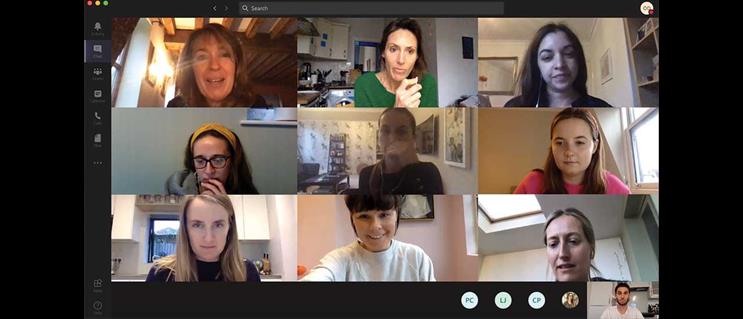The thrill of the new-business chase has been rather blunted by the Covid pandemic, as agencies and clients heeded government advice and took to their box rooms to spend their working days like millions of others ŌĆō hunched over a laptop squinting at video conference screens ŌĆō rather than being in the cauldron of a face-to-face pitch.
Most new-business bosses are itching to get back to real-world interaction and Tracey Barber (pictured, top left, with her Havas team), global chief marketing officer at Havas, is no exception.
While sheŌĆÖs tickled by the way WhatsApp groups are now used to issue diktats to the pitch team, such as ŌĆ£stop noddingŌĆØ or ŌĆ£change positionŌĆØ, Barber says: ŌĆ£I draw my energy from others ŌĆō I love the vibe, the energy and meeting new people and presenting great work. ŌĆ£She goes on to lament that ŌĆ£when a call ends, you simply leave ŌĆō thereŌĆÖs none of the post-meeting or corridor interactions or follow-upsŌĆØ.
Looking back on her year, Barber describes it as ŌĆ£exhausting, relentless and invigorating in many ways, as itŌĆÖs forced us to behave and think differentlyŌĆ” We have had to try harder ŌĆō more meetings, more calls, more time taken to get to the answer and in getting it right.ŌĆØ
Research from AAR shows the number of new-business appointments was down 44% in the first half of the year. This has started to ease but, as with so many things during the crisis, the pitching part of ad industry life has changed dramatically.
For those that went ahead, such as Halifax, Three and Walkers, remote pitching became the norm and the agencies involved seem to have equipped themselves accordingly, despite its obvious limitations. Win celebrations could still be fun ŌĆō the staff on VCCPŌĆÖs winning Walkers pitch team were all sent a bottle of Champagne and a packet of crisps ŌĆō but perhaps not as raucous as they once were.
ItŌĆÖs little wonder that the number of pitches has diminished. After all, coronavirus has thrown into focus what is really important, and holding a wholesale ad review, with all the disruption that it entails, might not be at the very top of the list.
ŌĆ£The fact is that, like most people, brand owners spent the first part of lockdown worrying about their own health and that of their nearest and dearest. In the next phase of the pandemic their concerns/share of mind were focused on their own customers and their businesses, Consequently, external agencies and the support they require from them has been a long way down their priority list,ŌĆØ Martin Jones, managing partner at AAR, says.
"When a call ends, you simply leave ŌĆō there's none of the follow-ups"
ŌĆö Tracey Barber, Havas
Stuart Pocock, founder of The Observatory International, agrees. ŌĆ£Whilst the ad world is naturally obsessed with the slowdown in pitches, the simple fact is that clients are focusing on survival... Running a pitch is the last thing on their minds,ŌĆØ he says.
But this tells only part of the story. Agencies also became more adept at servicing their clients in order to prevent them calling pitches, thereby also protecting their own businesses. Jones estimates that pre-lockdown, more than 70% of pitches (particularly creative ones) were caused by dissatisfaction with an existing agency. ŌĆ£Clearly, in lockdown, agencies have been concentrating on over-servicing their existing clients, thus removing the principal reason for reviewing,ŌĆØ he points out.
Not all consultancies and intermediaries have seen a decline, however. Tina Fegent, chief executive of Tina Fegent Consulting, says that those reviews that were creative or integrated continued but media has declined. She identifies an element of clients and agencies standing shoulder to shoulder to try to weather the pandemic.
ŌĆ£For me, I see that media agencies have really had to ŌĆśstand in the trenchesŌĆÖ with their clients the last few months, as media spend gets cut and replanned, and clients feel loyal to those agencies,ŌĆØ she says.
Barber contends that it is the type of pitches being held, rather than the quantity, that has changed. ŌĆ£We have seen projects for certain types of pitches ŌĆō digital and UX or CRM. Consultancy and business transformation projects have been particularly prevalent for Havas,ŌĆØ she says.
Angus Crowther, co-founder of Alchemists, concurs with this assessment. He says now that agencies are handling more disciplines beyond traditional creative and media, there is an opportunity for business development, where new-business pitches have waned. ŌĆ£WeŌĆÖre seeing fewer specialist pitches and more across the entire customer journey. More clients need help articulating their challenge, which requires more components from the marketing wheel,ŌĆØ he says.
So what does this mean for the future? In the short to medium term, itŌĆÖs difficult to see a return to those days of agency war rooms and pitch theatre, no matter how much the camaraderie is missed. Clients and agencies are more focused on pitch outcomes and the speed of ideas, rather than the more indulgent, lengthy pitches of old, according to Crowther.
This focus on thinking and ideas is no bad thing but William Lidstone, chief growth officer at Engine UK, argues: ŌĆ£You canŌĆÖt replace building rapport face to face, reading a room, reacting to a laugh or a genuinely meant compliment through a screen.
ŌĆ£Moving forward, it would be ill advised for any client to choose a long-term partner in this way, unless it was absolutely necessary,ŌĆØ he warns.
Hopefully, a combination of partnerships forged in real life, as well as a laser focus on business outcomes, isnŌĆÖt too far away.


